Waste management has become a crucial issue across various sectors, from households and hospitals to the industrial field. In response to this challenge, the Environmental Health Student Association (Envihsa) of the Faculty of Public Health (FPH) Universitas Indonesia (UI) held EnviTalk 1 2025, which also served as part of the third series of SEMOL FPH UI, carrying the theme “Best Practices in Waste Management Across Sectors.” The event was held on Saturday, May 17, 2025, in a hybrid format at the Auditorium of Building G, FPH UI. It featured speakers from the government, hospital, and industrial sectors, who shared insights and innovations in effective waste management.
Dien Anshari, S.Sos., M.Si., Ph.D., Manager of Student Affairs at FPH UI, expressed pride and support for the event. “We are very proud to facilitate this initiative. The theme is highly relevant and enriches learning beyond the classroom. Hopefully, this event will benefit the broader community, especially in tackling waste management issues that are our shared responsibility,” said Dien.
Dr. Zakianis, S.K.M., M.K.M., Head of the Environmental Health Department at FPH UI, emphasized the importance of cross-sector synergy in addressing environmental challenges. “Amid the growing complexity of environmental issues, we must strengthen interdisciplinary collaboration. Such collaboration is key to fostering more innovative and sustainable waste management solutions,” he stated.
The first speaker, Dr. Umi Zakiati, Head of Disease Prevention and Control at the Depok City Health Office, delivered a presentation titled “Waste Management from the Health Office Perspective in Depok City.” She explained that since 2019, Depok City has implemented Community-Based Total Sanitation (STBM), which includes five sanitation pillars, two of which—household waste and liquid waste management—continue to face major challenges. “The overcapacity issue at the Cipayung landfill is one of the most urgent concerns in waste management. We have formed a cross-agency task force and are working with the Public Works Office, Regional Development Planning Agency (Bappeda), and the Ministry of Public Works and Housing (ISWMP) to promote education and develop the EHRA (Environmental Health Risk Assessment) document,” explained Dr. Umi.
Next, Noni Chrissuda Anggraini, S.K.M., Sanitarian at the Universitas Indonesia Hospital (RSUI), presented “Domestic and Medical Waste Management at RSUI.” According to Noni, waste-related challenges in hospitals are persistent, not only in terms of handling but also in cost reduction and operational efficiency. RSUI promotes sustainable waste management through waste segregation, composting, and education. “We have a recycling waste station operated in collaboration with partners to reduce costs. Organic waste is composted and used for greening initiatives, while hazardous waste (B3) is sorted according to Ministry of Environment and Forestry guidelines,” she explained. RSUI also runs a waste bank program for staff to encourage active participation and waste sorting at the source.
In the industrial sector, waste management faces its own set of challenges. Noviaji Joko Priono, S.K.M., M.K.K.K., Head of Safety and Fire at PT Hyundai Motor Manufacturing Indonesia, delivered the final presentation titled “Solid Waste Management in the Industrial Sector.” He pointed out that industrial waste issues are often highlighted by public groups concerned with environmental impacts. Thus, having a robust waste management operation is essential for any industrial entity. Noviaji explained that managing industrial waste requires a comprehensive approach involving policies, facilities, and the engagement of both internal and external stakeholders. “Our company has implemented ISO 14001 on environmental management, mapped out waste bin placement, scheduled waste collection, and conducted training and awareness campaigns,” he noted.
Furthermore, he emphasized that industries are required to conduct Rintek (Technical Requirements Review) for hazardous waste (B3) management. “Companies that have been operating for some time usually have their own waste reduction technologies, while newer industries often focus on prevention, such as minimizing product defects and avoiding overproduction,” he added.
EnviTalk 2025 is expected to serve as a starting point for cross-sector synergy in improving waste management. This was reinforced by Nasywan Grananda, President of Envihsa 2025. “Waste has become a major issue in Indonesia that demands serious attention. I hope EnviTalk will spark collective enthusiasm, especially among students, to actively contribute to waste management efforts in their respective sectors,” he concluded. (ITM)

